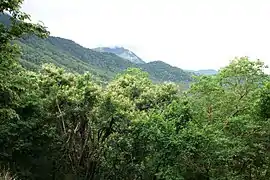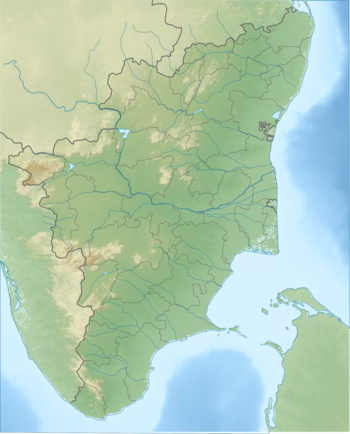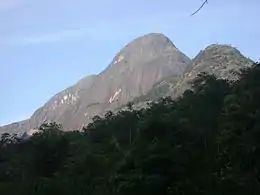Anaimalai Hills
The Anaimalai or Anamala Hills, also known as the Elephant Mountains, are the range of mountains that form the southern portion of the Western Ghats and span the border of Tamil Nadu and Kerala in Southern India. The name anamala is derived from the Tamil/Malayalam word aanai or aana, meaning elephant,[3] and malai or mala, meaning hill – thus Elephant Hill.
| Anaimalai / Anamala Hills Elephant Hills | |
|---|---|
 | |
| Highest point | |
| Peak | Anamudi, Kerala |
| Elevation | 2,695 m (8,842 ft) |
| Coordinates | 10°10′16″N 77°03′48″E [1] |
| Geography | |
 Location of Anamalai Hills | |
| Country | India |
| States | Tamil Nadu and Kerala |
| Range coordinates | 10°22′N 77°07.5′E |
| Parent range | Western Ghats |
| Topo map | (Terrain) |
| Geology | |
| Age of rock | Cenozoic 100 to 80 mya |
| Type of rock | Fault[2] |

Anamudi Peak (8,842 feet [2,695 metres]) lies at the extreme southwestern end of the range and is the highest peak in southern India. Palakkad Gap divides the Western Ghats to the north. The lower slopes of the hills now have coffee and tea plantations as well as teak forests of great economic value.[4] Dense monsoon forests including rosewood, sandalwood, teak, and sago palms cover most of the region, which helps the coffee and tea plantations and teak plantations grow.
The Western Ghats and Anaimalai Sub-Cluster, including the Anaimalai Hills, are currently under consideration by the UNESCO World Heritage Committee for selection as a World Heritage Site.[5]
Geography
The hills are located between 10° 13' and 10° 31' N. and 76° 52' and 77° 23' E with a central point of: 10°22′N 77°07.5′E. They are south of where the Western Ghats are broken by the Palakkad Gap, which in, turn is south of the Nilgiri Hills. They border on Kerala to the Southwest and the Cardamom Hills to the southeast. The Palni Hills lies to the east.
Their geological formation is metamorphic gneiss, veined with feldspar and quartz, and interspersed with reddish porphyrite.[6] Twelve major forest types are found in the area. The landscape is fragmented by many coffee and tea plantations on the lower slopes and teak plantations higher up. Monsoon rains are heavy. Annual rainfall varies from 2,000 mm to 5,000 mm in the area.[7] Formed by fault-block movements in the Holocene Epoch (i.e., about the past 11,700 years), the Anaimalai Hills descend to form a series of terraces about 3,300 feet (1,000 metres) high.
Fauna
The Anamala/Anaimalai Hills are known for their abundant wildlife. Eravikulam National Park, Chinnar Wildlife Sanctuary, Parambikulam Wildlife Sanctuary, and Anamalai Tiger Reserve located among these hills are well known for elephants. Numerous wildlife species can be seen including elephants, gaur, water buffaloes, tigers, panthers, sloth bears, pangolins, black-headed orioles, crocodiles, green pigeons, civet cats, dhole, sambar, black buck, and 31 groups of endangered lion-tailed macaques.[8][9] Birds seen include the Pied hornbill, Red whiskered bulbul and Drongo.
Recently, a new frog species, Beddomixalus bijui, was found within the forest.[10]
Hydrology

There are several rivers in the area including the Aliayar River, Apambar River, Chinnar River, Kaddambarrai River, Neerar River, Mannambhally, Pambar River and Parambikulam River. There are several large dams are in the area, including: Aliayar Dam, Amaravathi Dam, Kaddambarrai Dam, Neerar Dam, Sholayar Dam (one of the largest of its kind in Asia), Mannambhally Dam, and the Parambikulam Dam.
Tourism
The Anaimalai Hills are a popular trekking destination in the Western Ghats. Due to heavy rains during the wet season, the ideal time for tourism is between the months of November and May. SH-17 passes through the Anaimalai Hills, between Udumalapet and Munnar. The nearest town is Munnar. The nearest international airports are Cochin International Airport and Coimbatore International Airport.
Gallery
 Canopy of tropical rain forest in Anaimalai hills
Canopy of tropical rain forest in Anaimalai hills.jpg.webp)
References
- "Anaimudi/Anamudi, India". Peakbagger.com. Retrieved 12 March 2013.
- Singh, A.P.; Kumar, Niraj; Singh, B. (2006). "Nature of the crust along Kuppam–Palani geotransect (South India) from Gravity studies: Implications for Precambrian continental collision and delamination". Gondwana Research. 10: 41–7. doi:10.1016/j.gr.2005.11.013.
- Fabricius, Johann Philipp. (1972) J. P. Fabricius's Tamil and English dictionary, 4th ed., rev. and enl. Tranquebar: Evangelical Lutheran Mission Pub. House, retrieved 6/18/2007 anai (āṉai), an elephant Archived 24 October 2015 at the Wayback Machine
- "Anaimalai Hills | mountains, India". Encyclopædia Britannica. Retrieved 11 May 2016.
- UNESCO, World Heritage sites, Tentative lists, Western Ghats sub cluster, Niligiris. retrieved 4/20/2007 World Heritage sites, Tentative lists
-
 One or more of the preceding sentences incorporates text from a publication now in the public domain: Chisholm, Hugh, ed. (1911). "Anamalai Hills". Encyclopædia Britannica. 1 (11th ed.). Cambridge University Press. p. 913.
One or more of the preceding sentences incorporates text from a publication now in the public domain: Chisholm, Hugh, ed. (1911). "Anamalai Hills". Encyclopædia Britannica. 1 (11th ed.). Cambridge University Press. p. 913. - Sajeev T.K. et al., Management of Forests in India for Biological Diversity and Forest Productivity- A New Perspective, WII-USDA Forest Service Collaborative Project Grant No. FG-In-780 (In-FS-120), Volume III (ACA) Anaimalai Conservation Area Archived 16 March 2007 at the Wayback Machine.
- Singh, M; Kumar, MA; Kumara, HN; Sharma, AK; Kaumanns, W (2002). "Distribution, population structure, and conservation of lion-tailed macaques (Macaca silenus) in the Anamala / Anaimalai Hills, Western Ghats, India". American Journal of Primatology. 57 (2): 91–102. doi:10.1002/ajp.10037. PMID 12111684.
- Kumara, H. N.; Kumar, M. Ananda; Sharma, A. K.; Sushma, H. S.; Singh, Mridula; Singh, Mewa (2004). "Diversity and management of wild mammals in tea gardens in the rainforest regions of the Western Ghats, India: A case study from a tea estate in the Anamala / Anaimalai Hills" (PDF). Current Science. 87 (9): 1282–.
- Two novel genera and one new species of treefrog (Anura: Rhacophoridae) highlight cryptic diversity in the Western Ghats of India. Zootaxa 3640 (2): 177–189.
Further reading
- Anaimalais, the 'elephant mountains' Chapter One, Field Days: A Naturalist's Journey Through South and Southeast Asia By A. J. T. Johnsingh Contributor A. J. T. Johnsingh Published by Orient Blackswan, 2006 ISBN 81-7371-552-1, ISBN 978-81-7371-552-5, 339 pages
- British Library, India Office WD567, Hamilton, Douglas (1818–1892); Album of 17 drawings of views in the Anaimalai Hills (Cochin and Madras), pen-and-ink, 1863, European school| British school
- British Library, India Office WD568, Hamilton, Douglas (1818–1892); Album of 15 drawings of views in the Anaimalai Hills (Cochin and Madras), pen-and-ink, 1863, European school| British school
External links
| Wikimedia Commons has media related to Anaimalai Hills. |
